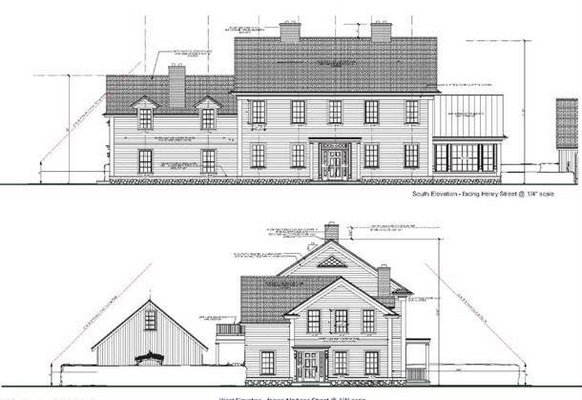
A Sag Harbor resident has filed a lawsuit against the village, saying officials stonewalled an application to renovate his home until it was finally blocked by the current moratorium.
Michael Gaynor has accused the Architectural Review Board of deliberately refusing to vote numerous times on his application for a certificate of appropriateness. His suit alleges that the ARB acted in an “arbitrary and capricious” manner starting seven months ago because it knew that the building moratorium was pending.
Mr. Gaynor has served more than 40 subpoenas to officials and community members in connection with the suit, which was filed in September.
“We think it was done intentionally, because they knew it was a new board coming in and a moratorium coming up,” said one of Mr. Gaynor’s attorneys, Alex Kriegsman, this week. “They wanted my client to get caught in it.”
Mr. Gaynor calls himself a historic preservationist, because he has restored many structures, including his current Sag Harbor Village home, the Benjamin Hope House. This week, he said he had the same intention when he bought a new home on Madison Street, at the intersection of Henry Street, in January. The suit says his goal at that time was “to preserve and enhance the 19th century home in a manner that protected its historical nature and complemented its surroundings.”
During three meetings of the ARB in the months following a informal discussion in March—when Mr. Gaynor said the ARB seemed to approve of his preliminary plans—the board repeatedly tabled his application. According to the petition, “the ARB failed to cite any provision in the village code giving the ARB the authority to indefinitely table or postpone consideration of applications pending before it.”
The lawsuit claims that the ARB in the meantime approved projects in which its own members are financially invested, holding other applicants to less stringent standards.
Among those subpoenaed for the suit are members of Save Sag Harbor, whose goal is to protect the village’s historic character and whose members are often present and vocal at various Sag Harbor board meetings. Mr. Kriegsman explained that the subpoenas were issued because he and his client believe that the organization has had an undue influence on the village boards.
“What is really going on in Sag Harbor is that there a few people here who are advancing their own personal interests,” Mr. Kriegsman said. “They have completely hijacked the village.”
However, Jeffrey Bragman, the attorney for Save Sag Harbor, accused Mr. Gaynor and Mr. Kriegsman of trying to stifle the group, “They are basically trying to force everybody on the board of Save Sag Harbor to divulge two years’ worth of emails in which they contacted anybody in the government,” Mr. Bragman said. “It is an attempt to inhibit their First Amendment right from talking to their government.”
The petition further claims that the six-month moratorium is arbitrary and unreasonable when applied to Mr. Gaynor, because the ARB cited the moratorium as the reasoning behind its denial of his application in July. According to the petition, the ARB never even determined whether the renovation of Mr. Gaynor’s home would, in fact, constitute “substantial improvement” and thus fall within the moratorium, which defines substantial improvement as renovations that would cost as much as or more than 50 percent of the home’s market value.
“Those folks have just sat on their hands, refused to vote and then pushed through the moratorium to block my project,” Mr. Gaynor claimed, adding, “Government does not get any dirtier than that.”
The suit further criticizes the moratorium on its face, saying that the result of the moratorium is the exact opposite of its purpose, which is to keep the village’s historic character by curbing development and temporarily suspending the processing of certain building permits. By nature, historic renovations are more expensive than simply renovating a house, the suit says. “Yet the moratorium fails to recognize or refute the fact that less expensive renovations would appear to be a greater threat to the historic character of the village than expensive ones,” it says.
The moratorium also applies to the construction of new homes larger than 3,500 square feet on lots that are less than one-half acre and to houses of more than 5,000 square feet on lots that are larger than one-half acre. Mr. Gaynor’s home sits on .38 acre and is 2,591 square feet. He had applied to expand his home to 4,211 square feet, but under the zoning code and without the moratorium in place, could have built a home as large as 5,181 square feet, he said.
Village Attorney Fred. W. Thiele Jr. explained that it is not unusual for negotiations with the ARB to go on for months, but said that the village must be reasonable and cannot wait an extended amount of time to make a decision. “There is no time frame for voting and specifically the ARB process is kind of a give and take, back and forth,” he said.
In this lawsuit in particular, Mr. Thiele said that “the village’s major objection to it is, ‘You went to court too fast.’” He added that the judge will say that Mr. Gaynor has not exhausted all of his administrative options, including to apply for an exemption from the moratorium himself.
Nevertheless, Mr. Gaynor believes he has been denied his due process of law: “I have an unlimited amount of resources to apply to this case, and so that’s what I am going to do.”